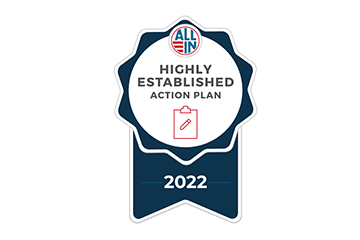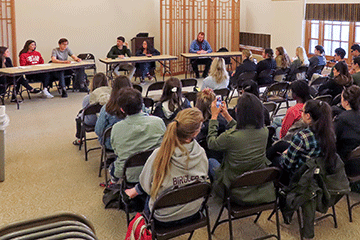
08/30/2022
SUNY Cortland is one of only 82 institutions of higher education in the United States recognized for action plans promoting student participation in elections by ALL IN Campus Democracy Challenge, a national, non-partisan program promoting college voter registration and turnout efforts.
Cortland’s action plan for engaging students in democratic engagement, including voting, earned a Highly Established Action Plan Seal of recognition from the group, one of the largest of many organizations in the U.S. that promote college students' participation in the democratic process.
Each participating campus submits a detailed action plan that describes how it will reach its voter registration and turnout goals.
“This Seal recognizes SUNY Cortland’s commitment to educating and motivating civically-engaged students,” said John Suarez, director of the university’s Institute for Civic Engagement.
Housed in SUNY Cortland’s Division of Academic Affairs, the Institute for Civic Engagement serves as a resource for students, faculty, staff and community partners by promoting the development of mutually-beneficial opportunities for learning through service and hands-on-experience.
The Challenge considered 932 action plan participants, each of which submitted a detailed outline of how it will reach its voter registration and turnout goals. Only three other SUNY institutions made the “highly established action plan” list.

“This is not something you send in with some flip statement, ‘Yeah, this is what we’ll do and we’ll get there somehow,’” Suarez said. “They want the details. They want to know names. They want to know dates. They want to know relationships between people on a working basis. This is an action plan that takes commitment.”
Cortland’s 22-page action plan includes voter registration, voter turnout and voter education activities ranging from presentations to debates to deliberative dialogues. Such dialogues are important because they help participants practice discussing divisive issues in informed, civil and productive ways.
Suarez gave as an example one large upcoming event that includes a presentation, Q&A with elected officials, and a deliberative dialogue: this year’s Constitution Day event on Sept. 20, purposely scheduled on National Voter Registration Day rather than the actual Constitution Day, which falls this year on a Saturday.
The Challenge was launched in 2012 when just 39% of young adults ages 18 to 29 and 47% of college students voted in the presidential election; and sharply fewer two years later in the midterm election. The National Task Force on Civic Learning and Democratic Engagement had called on the U.S. to reclaim higher education’s civic mission.
“Through institutional engagement, direct student engagement, and fostering a national higher education network, ALL IN strives for an electorate that mirrors our country’s makeup and in which college students are democratically engaged on an ongoing basis, during and between elections, and not just at the polls,” according to ALL IN's website.
The ALL IN Challenge doesn’t support or oppose candidates for public office or take a stand for or against any political party.
Now SUNY Cortland must work to attain the highest voter registration and election turn-out rates possible by November 2024, 90% if possible, according to Suarez. Those rates were 77% and 24% in 2018 and 85% and 69% in 2020, respectively.
“To get to that point, the action plan calls for an ‘all hands on deck’ effort,” Suarez said. “It involves people in offices and departments from across campus, as well as collaboration with organizations in the greater Cortland community.”
Because the campus and community are collaborating on this work, ideally their partnership will lead to increased voter registration and voter turnout rates for the city and county of Cortland, including among eligible high school students, he noted.
As part of the action plan, the institute will work with faculty to design nonpartisan ways of incorporating discipline-based explorations of current issues as well as concepts regarding citizenship into course syllabi.
“Students need to be able to take what they are learning — along with their career dispositions like working with people you are unfamiliar with — and combine those into their work in civic decision-making actions that include not only voting but working with the city council or addressing the student senate, for example,” Suarez said.
“You’re using what you’re learning not just for your career but to help guide this ship of a democratic republic,” Suarez said.
“The institute, at least for the next two years, needs to have as its North Star, its guiding light, democratic engagement,” Suarez said. “It’s so reflective of SUNY Cortland’s mission statement, its strategic plan. It really needs to be part of our culture.”
SUNY Cortland currently holds the prestigious community engagement elective classification from the Carnegie Foundation for the Advancement of Teaching through 2025 as both the first institution in the State University of New York system to capture this milestone in 2008 as well as the first one to hold the reclassification distinction.